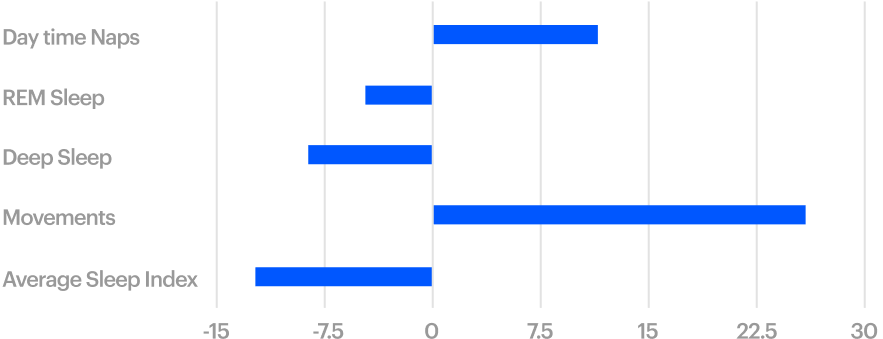An overwhelming majority of Muslims across the world observe the holy month of Ramadan and its associated period of intermittent fasting. Ramadan is a period of spiritual reflection and self-discipline and is currently underway until April 10th 2024. For the remaining rest, Ramadan’s cultural and economic influences are profound1, 2. Though there are established long-term metabolic and physiologic benefits for individuals observing Ramadan fasting, sleep is known to be disrupted in families and solo-living individuals3,4,5,6. Some of the metrics monitored include, delayed sleeping time, disrupted sleep due to morning prayers and eating and general day-time lethargy. It is pertinent to note that these insights are derived from population and group studies. However, personalised sleep tracking is an emerging concept and studies have focussed on observing sleep habits of individuals with clinical conditions such as diabetes7. While undoubtedly important, it is also equally important to have baseline data for healthy individuals for this important period. Moreover, wearable devices being adaptable should offer tailored sleep tracking to help a user power through this special and important period of the year.
We, at Ultrahuman, observed early changes in sleep profiles of our users in the Gulf Cooperation Council (GCC) region with the onset of the holy month. We found that not only did people start going to sleep later by over 70 mins, but they also showed a remarkable drop in sleep index, percentage of deep sleep, coupled with increased periods of wakefulness and movement (see graph below). Expectedly, people caught up with sleep via day-time naps, the duration and frequency of which also showed a sharp increase. These trends are visible within the first week and we will be tracking week-on-week changes as the month progresses to provide users with refined and population-level insights.
Ramadan did propel us to think of ways to make the Ultrahuman Ring Air more aligned with this period of self-directed purpose shared across a large number of our users. Hence, we developed a Ramadan mode which involves customizations to better suit these sleep patterns changes. This specific mode alters the way Sleep Index is calculated, which is a reflection of the overall sleep health of a user for the day, by modifying the contributing weightages of sleep epochs in nocturnal time windows and emphasising on the value of day time naps.

Ramadan emphasises an individual’s link to the community fostering cohesion and long term social wellbeing, and the use of the Ramadan mode is hoped to allow for Ultrahuman Ring users to optimise their sleep efficiency and overall well being, while contributing valuable real world data for further development of supportive wearable technology.
1. Campanate & Yanagizawa-Drott. (2015) Does religion affect economic growth and happiness? Evidence from Ramadan. The Quarterly Journal of Economics 615–658. doi:10.1093/qje/qjv002
2. https://ijaazah.com/cultural-social-impact-ramadan-fasting-around-world/
3. Rouhani MH, Azadbakht L. (2014) Is Ramadan fasting related to health outcomes? A review on the related evidence. J Res Med Sci. 19(10):987-92. PMID: 25538785
4. Roky R, Chapotot F, Benchekroun MT, Benaji B, Hakkou F, Elkhalifi H, Buguet A. (2003) Daytime sleepiness during Ramadan intermittent fasting: polysomnographic and quantitative waking EEG study. J Sleep Res.12(2):95-101. PMID: 12753346.
5. Khan MAB, BaHammam AS, Amanatullah A, et al; (2023) Ramadan Intermittent Fasting Collaborators. Examination of sleep in relation to dietary and lifestyle behaviors during Ramadan: A multi-national study using structural equation modeling among 24,500 adults amid COVID-19. Front Nutr. 10:1040355. PMID: 36969823
6. Al Harbi KM, Alsaleem LS, Alsaidan AI, Almalki BS, Qutub R, Alammari Y. (2023) Quality of Sleep in the Saudi Population During the Holy Month of Ramadan.Cureus. 15(12):e50897.PMID: 38249278.
7. Alghamdi AS, Alghamdi KA, Jenkins RO, Alghamdi MN, Haris PI. Impact of Ramadan on Physical Activity and Sleeping Patterns in Individuals with Type 2 Diabetes: The First Study Using Fitbit Device. (2020) Diabetes Ther. 11(6):1331-1346. doi: 10.1007/s13300-020-00825-x. Epub 2020 May 4. PMID: 32367477; PMCID: PMC7261298.